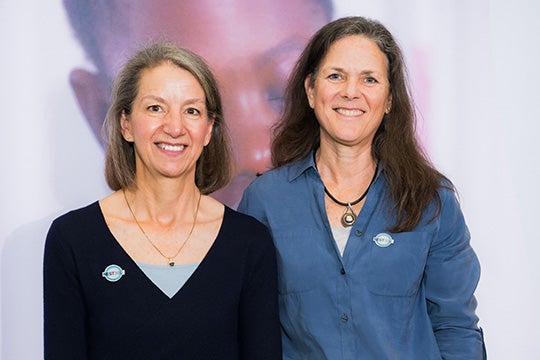Big Steps for Little Ones
Rice360 is helping improve newborn care across Africa.

Spring 2024
By Mike Williams
The most vulnerable babies around the world have a better chance of survival today than they did five years ago. Over the next five years, their odds should improve even further, as the Newborn Essential Solutions and Technologies (NEST360) alliance, co-founded by Rice360, embarks on the second phase of its quest to protect newborns in sub-Saharan Africa.
The Rice360 Institute for Global Health Technologies, led by bioengineers Rebecca Richards-Kortum and Z. Maria Oden, was founded to train students to develop innovative solutions to health challenges in low-resource settings around the world. Today, innovation that began at Rice360 has attained global reach, in large part through NEST360, an international alliance of clinical, biomedical and public health experts.
NEST360 helped establish a network of nation-led programs in Kenya, Malawi, Nigeria and Tanzania — and has now expanded to Ethiopia. The organization relies on government, health and commercial partners in the U.S., United Kingdom and Africa to support its goal of transforming how newborn care is provided in African hospitals. “Improving quality for small and sick newborn care in NEST360-implementing countries and beyond requires a systems-change approach that cuts across all levels of care,” says co-founder Richards-Kortum.
Improving quality for small and sick newborn care in NEST360-implementing countries and beyond requires a systems-change approach that cuts across all levels of care.
In January, NEST360 announced $65 million in new foundation and donor funding — more than two-thirds of the $90 million needed to launch a five-year Phase 2 to build on its progress in aligning with the United Nations’ goal to limit newborn deaths to no more than 12 per 1,000 live births by 2030.
Rice360 supports NEST360 in identifying and deploying effective, rugged and affordable medical technologies for newborn care. Where no such solution exists, Rice360 has invented medical technologies that can be built economically and maintained locally. Ultimately, the goal is for engineers and inventors across Africa to meet the needs of newborns.
Rice360 has identified 22 sustainable technologies to prevent newborn deaths, including diagnostic and respiratory support devices. Among them are the Rice-developed BiliDx, Celsi Monitor, Celsi Warmer and Pumani devices, all of which started as student projects. Pumani, a low-cost bubble CPAP unit for newborns, now deployed in over 50 countries, was an early success that defined the path to design and develop more health care devices.
“As I think about how one device designed by a Rice360 undergraduate team, with partners from Malawi and guided by the fundamental principles of the engineering design process, led us toward building an alliance to support newborn survival across Africa, I have so much hope for the future of global health innovators and newborn care,” Oden says.
The Rice360 team continues to explore new ways to close health equity gaps and address needs in low-resource settings around the globe, including in rural and urban communities in Texas, she adds. To that end, they also recently launched the NIH-funded Center for Innovation and Translation of POC Technologies for Equitable Cancer Care, leveraging nearly two decades of collaboration with partners in Houston, Brazil and Mozambique. The center will develop point-of-care tests for oral, cervical and gastrointestinal cancers, adding to the Rice360 portfolio of innovation to meet the health needs of underserved communities.
Learn more at rice360.rice.edu.
